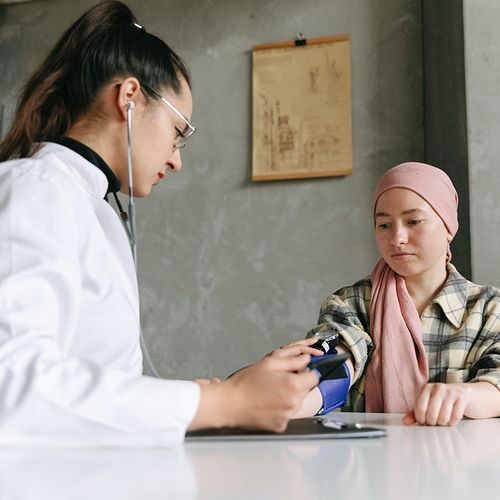You probably know that about one of every three American adults has high blood pressure (hypertension. But you may not realize that there are two types of hypertension-primary and secondary. The distinction is crucial since primary and secondary hypertension require different treatment. With the wrong treatment, hypertension can go uncontrolled, which can lead to kidney failure, stroke or even death.
The cause of primary hypertension is unknown, but genetics is among the most likely culprits. Primary hypertension often starts in a person's mid-20s, with readings creeping upward as the years go by. It's treated with diet and exercise and/or antihypertensive drugs.
Secondary hypertension, which usually comes on quickly and can occur in people with no family history of high blood pressure, is actually a symptom of a pre-existing problem. Underlying health problems can be the trigger for secondary hypertension. The most common include congenital heart defects, kidney disorders (including a tumor on the adrenal gland at the top of the kidney) or hormonal disorders (including overactive thyroid or overproduction of the steroid hormone aldosterone). Secondary hypertension also can result from medications, including steroids, migraine drugs, the antidepressant bupropion (Wellbutrin) and nonsteroidal anti-inflammatory medicines, such as ibuprofen (Motrin). But lifestyle issues, such as sleep deprivation, obesity, chronic stress, pregnancy or excessive alcohol consumption, can also be a long-term contributing factor to high blood pressure.
When I see a patient with high blood pressure, I look for such an underlying cause. I do a physical exam and order a variety of blood and urine tests. I also inquire about personal habits, including sleep, exercise and diet, and review the patient's prescription and over-the-counter OTC) medications and supplements ones with licorice, ephedra or an ingredient to which a person is allergic can raise blood pressure) Talso ask about major life shifts, such as a move, divorce or job change—all can affect blood pressure.
When the underlying cause is treated, the hypertension usually goes away. A change in prescription or OTC medication may be needed. Psychotherapy or a class in stress management may be the answer. Hormonal problems often are resolved with hormone therapy. Kidney disorders may require the care of a specialist. With some patients, I treat the underlying problem and prescribe antihypertensive medicines.
A healthful diet is essential for anyone with high blood pressure. My favorite is the so-called DASH diet, Dietary Approaches to Stop Hypertension. To learn more about this diet, which is high in fruits, vegetables, dietary fiber, magnesium and potassium, check www.dashdiet.org, Daily yoga and breathing exercises also help both primary and secondary hypertension.
Try this: Hold one finger over your right nostril and breathe in and out through the left nostril for 15 breaths, then repeat with the other nostril. Usually, this immediately lowers the blood pressure and can be done as often as you wish. Results may last for an hour or all day, depending on the person.
Most Americans Will Get High Blood Pressure
Did you know that 90% of Americans will develop high blood pressure as they age, increasing their risk for heart disease and stroke? Over five years, the average systolic blood pressure (top number of people ages 45 to 64 increased by five points.
Primary reason: Long-term exposure to sodium in processed and restaurant foods.
